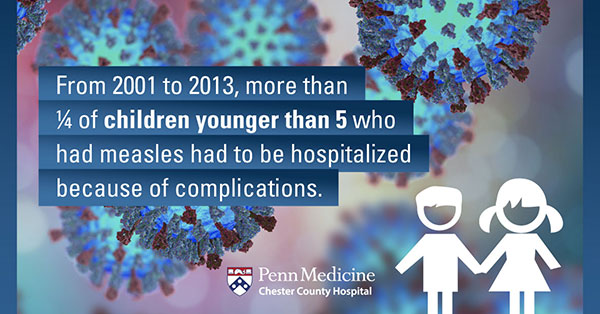Here's what you should know about measles - and how you can keep yourself and your loved ones safe.
Measles is a serious infection caused by a virus. It's mostly a childhood disease - about 80% of cases in the United States are in people ages 19 and younger. However, you can also get measles if you're an adult - and it's usually more serious if you do. Adults with measles are 10 times more likely to be hospitalized because of complications, such as pneumonia.
In the first 2 to 3 days after symptoms start to appear, small white spots (called Koplik spots) may appear on the inside of the mouth.
Then, about 3 to 5 days after the initial symptoms begin, you'll develop a rash, which will spread from your face downward. At this point, you may have a very high fever of 104° Fahrenheit or higher.
The fever and rash usually go away after a few days, but you can still be contagious up to 4 days after the rash disappears.
Measles isn't like strep throat or a sinus infection - it's caused by a virus, rather than bacteria, and it can't be cured with antibiotics. There is currently no treatment to get rid of measles. However, there are ways to ease symptoms, such as taking fever reducers, while the disease runs its course.
"Some people assume measles is just a little rash and a fever that will clear up in a few days. However, measles can cause serious health complications, especially in children younger than 6 and adults older than 20. And there's no way to tell how serious symptoms will be in advance," says Theresa Metanchuk, DO, a family medicine physician at Penn Family Medicine Southern Chester County.

From 2001 to 2013, more than ¼ of children younger than 5 who had measles had to be hospitalized because of complications.
It's not uncommon for children with measles to also develop ear infections or have diarrhea.
There are several more serious complications, which occur in almost ⅓ of all reported measles cases. These can happen at any age and include:
- Pneumonia (infection in the lungs) occurs in as many as 1 in every 20 children with measles. It is the leading cause of death from measles in children under 5.
- Acute encephalitis (swelling of the brain) occurs in about 1 in every 1,000 children with measles and can lead to hearing loss and permanent intellectual disabilities. Acute encephalitis is the leading cause of death from measles in adults.
Measles may also cause women to give birth prematurely or have a child with a low birth weight, which can put babies at risk for infections, illnesses, delayed motor and social skills development, or learning disabilities.
The Measles Virus Spreads - but It Doesn't Have To
If you've had measles before, or have received the measles-mumps-rubella (MMR) vaccine, you are immune and cannot get measles (or get it again). But if you're not immune, you could be at serious risk for getting measles.
Measles is one of the most contagious diseases in existence - 9 out of 10 people who are not protected (immune) will get the disease if exposed to someone who has it.
The measles virus lives in your nose and throat mucus, so any time you cough or sneeze, and someone else breathes in that infected air or touches an infected surface, they can become infected. The virus can live for up to 2 hours in the air after an infected person leaves the room.
Measles is still common in other countries around the world, including some in Europe, Africa, and South America. This means it's possible to get the disease while traveling and bring it back to the United States. If the disease spreads to places with many unvaccinated people, it can cause an outbreak.
You may not know if you've been exposed to the measles virus because infected people can spread the measles virus 4 days before and after the rash appears. And while the chances are very small, you can still get measles if you're vaccinated, but your symptoms are more likely to be mild and less noticeable. If you're vaccinated, you're much less likely to spread the virus to other people - even if you don't know that you can.
"The best way to protect against measles is the MMR vaccine. The standard two-dose vaccine is 97% effective at preventing this disease. When enough people get the vaccine, the entire community is less likely to get it, but you should not assume that everyone else has been vaccinated and you don't need to. Take action to protect yourself and those around you by ensuring you are properly vaccinated," adds Dr. Metanchuk.

Who Should Get the MMR Vaccine?
All children should receive the MMR vaccine, as well as some adults who haven’t received the vaccine or the disease, such as:
- Children ages 1 to 6, with the first dose between 12 and 15 months and the second dose between 4 and 6 years
- Children younger than 12 months old who are traveling outside the United States, who should get only one dose of the vaccine
- Adults age 18 and older born after 1956 who have not had measles, who need at least one dose of the vaccine
Certain people should not get the vaccine, such as pregnant women or people who have had a life-threatening reaction to either the first dose of the measles vaccine or an ingredient in the vaccine (such as the antibiotic neomycin) in the past.
At any age, there are certain conditions that may weaken your immune system and delay or prevent your ability to be vaccinated. Tell your physician before getting vaccinated if you:
- Have HIV/AIDS
- Have cancer
- Are taking any medications that weaken your immune system (such as corticosteroids, which can be used to treat conditions like arthritis or asthma)
- Have ever had a low platelet count
- Have received another vaccine in the past month
- Have recently had a blood or plasma transfusion
- Are sick, as you may need to wait until you're feeling better to get the vaccine
Your Role in Preventing the Spread of Measles
Those who are unable to get vaccinated against measles rely on the people around them to be vaccinated. The protection that vaccinated people provide is called herd immunity (also called community immunity). More than 96% of people in a community must be vaccinated against measles to provide herd immunity. While measles is most harmful to young children and adults, everyone plays a role in spreading the disease.
Before the MMR vaccination program began in the United States, an estimated 3 to 4 million people got measles each year, which led to at least 48,000 hospitalizations and 500 deaths - and these were just the reported cases.
While most Americans think the health benefits of the MMR vaccine outweigh any risks, there are still pockets of unvaccinated children and adults. Getting the MMR vaccine not only lowers your risk of getting measles, but it can save the lives of those around you from this contagious disease.
When you get the MMR vaccine, you are helping to keep you, your family, and your community safe from measles.
If you have questions about measles or the MMR vaccine — or want to discuss getting yourself or your child vaccinated - call 610-738-2300 to find a primary care provider near you.
Related Information: